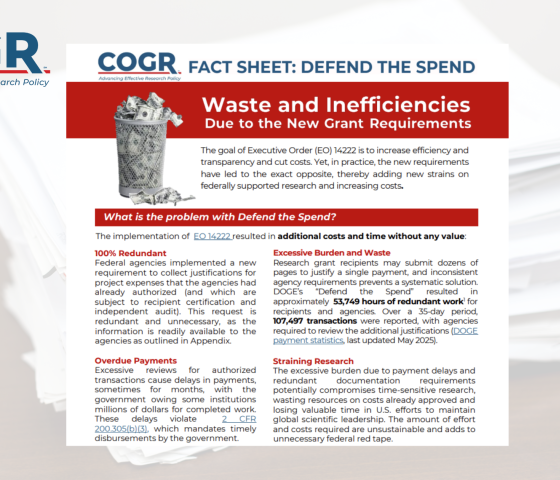Executive Order 14222, intended to enhance efficiency and transparency and reduce costs in federally funded research, has instead imposed significant new...
Other Post Award
Financial research accounting, management, and billing activities are subject to various and evolving requirements. COGR assesses and reports on significant changes, as well as advocating for practical requirements that provide effective safeguards without undue administrative burden.

Featured
Points to Consider for Reimbursement of Expenses Under Active Grants (V.2): Framework for Navigating the 2025 Administration Transition
Changes to federal payment systems, processes, and requirements implementing
Updated: Costing Points to Consider for Terminations and Suspensions (V.2)
Communications from federal agencies about terminations and suspensions are inconsistent with each other and often with sponsor policies and Uniform Guidance.&…
Resources
Point of Contact
All Other Post Award Articles
COGR Responds to OMB's Request to Provide Data-driven Evidence to Support Modifications to 2 CFR Chapter 2, Part 200 (2 CFR 200) of the Uniform Guidance (UG)
The document is a formal letter from the Council on Governmental Relations (COGR) to a policy analyst at the Office of Federal Financial Management, Office of Management and Budget (OMB), addressing proposed revisions to 2 CFR Chapter 2, Part 200 (Uniform Guidance) as it relates to federally funded research at academic institutions. Drawing on recent surveys and studies, COGR advocates for three p
COGR Participates in Joint Association Response to Comment Request; Agency Information Collection Activities; Submission to OMB for Review and Approval; Foreign Gifts and Contracts Disclosures
The letter, submitted by the American Council on Education and numerous higher education associations, provides formal feedback on the U.S. Department of Education’s (ED) proposed Information Collection Request (ICR) concerning the reporting of foreign gifts and contracts under Section 117. While acknowledging the significance of research security and transparency, as well as recent improvements s
COGR Responds to OMB's RFI: Uniform Guidance (2 CFR 200)
COGR has posted its Letter to OMB, in response to OMB’s Request for Information (RFI) – Uniform Guidance. We expect OMB to review responses from all stakeholders and publish proposed revisions to the Uniform Guidance later in 2023.
COGR Posts DRAFT Response to OMB (Uniform Guidance)
The Council on Governmental Relations (COGR), representing over 200 U.S. research universities and affiliated institutes, submitted a detailed response to the Office of Management and Budget’s (OMB) Request for Information regarding proposed updates to federal grant regulations (notably, 2 CFR Parts 25, 170, 175, 176, 180, 182, 183, and 200). The letter outlines a series of recommendations aimed a
COGR Requests a 30-Day Extension to Respond to OMB's RFI
COGR requested a 30-day extension to respond to OMB’s RFI regarding updates to 2 CFR Part 200, Uniform Guidance.
COGR Submits Letter to HHS on Timely Establishment of Indirect Cost and Fringe Benefit Rate Agreements
COGR submitted a letter to Mak Karim, the National Director for Cost Allocation Services at the U.S. Department of Health and Human Services. In the letter, COGR requests assistance to facilitate improvements in the speed of the review and approval process associated with indirect cost and fringe benefit rates.
COGR Submits Comments to NASA on T&C's Affecting Procurement
COGR submitted formal comments in response to NASA's proposed requirement for recipients of financial assistance awards to obtain quotations from small and/or minority businesses, women's business enterprises, or labor surplus area firms for acquisitions exceeding the simplified acquisition threshold. While COGR expresses strong support for President Biden’s Executive Order 13985 on advancing raci
Dept of Veterans Affairs Memorandum: Guidance Regarding the Without Compensation and State Treasury Exceptions
The memorandum from the Department of Veterans Affairs Office of General Counsel addresses the application of 18 U.S.C. § 209, a federal statute that generally prohibits VA employees from receiving compensation for their federal work from non-federal sources. It clarifies updated Department of Justice guidance and focuses on cases where VA research employees seek payment directly from non-federal



